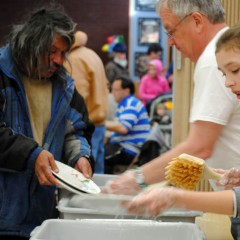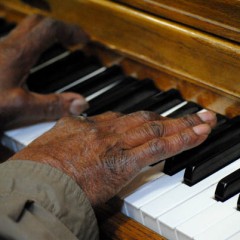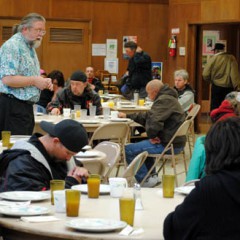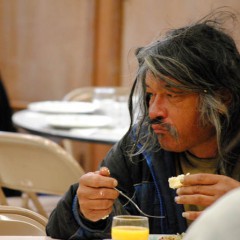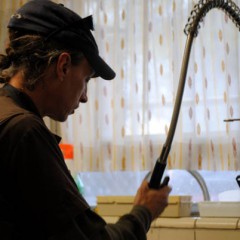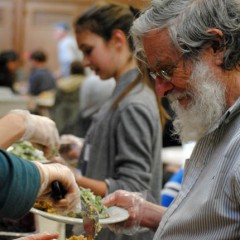It’s a warm spring evening in Browne’s Addition, and Coeur d’Alene Park is filled with people walking dogs and playing Frisbee. A few of them wander into All Saints Lutheran Church across the street, where doors are propped open in preparation for Tuesday night’s weekly meal hosted by the Rev. Alan Eschenbacher and a group of dedicated local volunteers. Tonight’s special is spaghetti and chicken, and it’s going fast.
As guests eat their fill, volunteers stack bags of potatoes, pears and canned goods on the stage in the large room to hand out as takeaways. In addition to the free weekly meal, All Saints works with Second Harvest and other local food distributors to stock and staff a food pantry that distributes approximately 1,500 pounds of food per week.
All Saints wasn’t always this busy. When Eschenbacher arrived at the church in 2003, membership was down to less than 40 and the average age was 75. No new people were joining. Eschenbacher decided to take a few risks. He and the few remaining members invested what little they had into remodeling their kitchen to meet required health standards and revived a forgotten meal program that had flourished in the church decades ago. First a few people came, then more. Now Eschenbacher and his volunteers serve more than 80-120 people per week.
One of these people, says Eschenbacher, and his hands-on brand of religion gave him a reason for being. Robert Chenault wandered into a Tuesday night meal in 2008 with his college friend Leona, seeking food and direction. The Navy veteran arrived in Spokane with few material possessions. A Hurricane Katrina evacuee from New Orleans, Chenault ended up in a Texas prison in 2007 for a drug possession charge, where he served a year and a half. After his release, he traveled to Washington to find his father, go to college and begin his life again. Chenault wasn’t sure where his life was going, but he didn’t expect to end up in a church. He was raised with strict Christian parents, and left without looking back.
“After 20 years of being out of organized religion, the last thing I wanted to do was join a church,” Chenault said. “[But] I was led here. I don’t know by who or what, but I know I’m in the right place.”
Chenault and Leona, who is now his wife, offered to wash dishes after their meal. Soon Chenault was volunteering regularly at the meals, and Eschenbacher asked him to coordinate the community garden at the church, which is used by more than 40 local families. Chenault says the sense of belonging and trust Eschenbacher gave him by giving him a job and a community keeps him coming back several times a week.
“I don’t get paid a whole lot, but I feel fulfilled because I’m putting into the community that gives back to me,” he said.
Chenault, Leona and their stepson are now members of Eschenbacher’s church, and they attend regularly, as well as work to run some of the church’s service programs. There are many — the Tuesday night dinners were just the beginning for Eschenbacher and the staff.
After the Tuesday dinners were established, All Saints opened the food pantry, began a community garden and a prison ministry, and worked with local mental health officials to start a mental health chaplaincy modeled after a successful Seattle program. Their next project includes partnering with Peaceful Valley Community Center to build a new space for the centers after school program. The program is affordable and therefore in high demand, but the demand outweighs the space in the current community center.
“Peaceful Valley can handle 40 kids and they’re packed in there like sardines. It’s not safe. By moving them [to All Saints], they can double the amount of quality, safe space in their program. That’s the bottom line,” Eschenbacher said.
All Saints has received pushback from neighbors in Browne’s addition who claim their homeless programs are drawing undesirable people into the neighborhood. Eschenbacher has little patience with such claims.
“No one wants it in their neighborhood,” he said. “The Bible is clear — we are supposed to take care of each other. We can either continue to look at [the homeless] as undesirable or we can embrace people who need help and give them help.”
Eschenbacher is modest about the impact his church is making on the neighborhood. “This is what the Christian church is called to do,” he said. “We’re not doing a new thing. We’re reviving what the church always was.”




